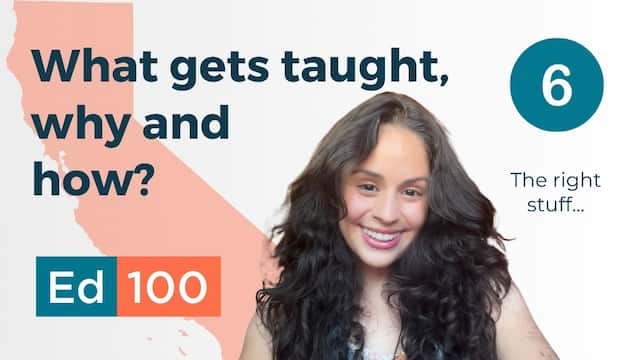
To be ready for life as a grownup, students need some financial skills.
In This Lesson

What is financial literacy?
Do California students learn about financial literacy?
What should a financial literacy class include?
What are the costs of financial illiteracy?
What policies in California relate to financial literacy?
Do financial literacy classes make a difference?
▶ Watch the video summary
★ Discussion Guide
For many years, California schools took an ineffective approach to teaching financial skills. In 2024, the state changed the strategy in a way that should benefit the financial literacy of future generations of Californians. The change will take time. This lesson reviews the background of the issue, the research that compelled change, and some of the things schools can do proactively.
What is financial literacy?
Financial literacy is the capacity to make wise decisions involving money, assets, and debt.
No one is born financially literate. On the path to adulthood, students must acquire the skills they need to support themselves and those they care about.
Society has an enlightened interest in a financially literate public. From a policy perspective, the main vehicle to equip people with basic financial literacy skills is the public education system. Unfortunately, most schools have been ineffective at work of preparing students to understand and navigate their financial self-interest.
Financial skills must be taught
At some level, personal finance is common sense and self-discipline, Ben Franklin-style. A penny saved is a penny earned, right?
Sure, but the economy is full of cheerful businesses, brilliantly marketed, that want to lend you a hand now in exchange for an arm and a leg later. It is easy to walk past some of the most discouraging parts of the financial service economy without even noticing. More than a decade ago, California Governor Gavin Newsom quipped that "the nation has as many check-cashing and payday loan businesses as it does McDonalds and Starbucks Coffee stores combined." In 2022, Pew Charitable Trusts reported that California still had few safeguards to protect borrowers.
These payday advance services make their money by lending to financially vulnerable borrowers — but for the poor, some banks can be even worse. In 2023 (a good year) about 4.3% of California households were unbanked, but the rate among those without a high school diploma was much higher — about 17%.
The public has a shared interest in protecting vulnerable consumers from loan sharks. In 2024, the U.S. Suprememe Court affirmed the independence of the federal Consumer Finance Protection Bureau, an agency that receives its funding directly from the Federal Reserve. Consumer advocates hailed the decision as a crucial win.
California's financial literacy education strategy is changing.
"Weaving" failed
For decades, California expected schools to teach financial skills bit by bit, weaving financial topics into other subjects rather than teaching them explicitly as a separate course. Topics to be covered across multiple courses included budgeting and managing credit, student loans, consumer debt, and identity theft security. The 2016 California History-Social Science Framework documented the approach.
Idealistically, this approach made it every teacher's job to teach financial skills. Practically speaking, it became nobody’s job.
The strategy of weaving financial education across many courses was not effective. In 2022, the Nation's Report Card on Financial Literacy awarded California a grade of D for its approach to teaching financial skills.
In other reviews of financial literacy education among the 50 states, Champlain College awarded California a failing grade. The Council for Economic Education expressed similar concerns.
California's financial literacy education revolution
In 2024, California state legislators chucked the state's ineffective "woven" approach to financial literacy. By the 2026-27 school year, all high schools must provide a semester-length course on personal finance. It will become a statewide graduation requirement for the class of 2031.
This requirement passed into law partly in response to a campaign that threatened to place an initiative measure on the ballot if the legislature failed to act. Implementation details about the new course will be worked out by the state Instructional Quality Commission for approval by the State Board of Education by the end of May 2026. Listen to this episode of Education Beat to get a feel for what the course could be like:
It can take a long time for changes in an educational framework to be implemented in the specific course offerings or requirements of any given school. In California, textbooks and learning materials are adopted by school districts, which have a lot of power and latitude in how they respond to changes in curriculum frameworks. Changes in curriculum frameworks do not typically result in quick changes or in mandates for school districts to offer or require specific courses.
Schools can get ahead of the coming changes by identifying faculty with an interest in financial education.
Financial literacy can avoid expensive mistakes
Financial blunders can have huge consequences for individuals, families and communities. In a deeply flawed but much-quoted national survey, respondents blame their own lack of financial knowledge for an average of $1,506 in losses, implying a nationwide shot-in-the-dark total of $388 billion. It's a squishy estimate, but the point is that financial mistakes are common, costly, and preventable. Some of the major costs of financial illiteracy aren't counted in dollars and cents: financial uncertainty is a massive source of stress and conflict.
Does financial education work?
A course in financial literacy is meant to equip students to make wise choices and help them avoid making costly errors. Does it?
The short answer is yes, but studies suggest that it's important to have realistic expectations. World Bank studies of small financial education interventions have registered only modest effects, for example. Switching to a dedicated course is likely to produce uneven effects depending on how well the curriculum matches the financial context of the students involved. Financial education feels relevant if you have money, or expect to. If you don't, it can feel like preaching or wishful thinking.
In 2019, a study focused specifically on the impact of financial education on African-American college students. The study, which includes a useful rubric, found that effective programs have to include practice to be effective. Theoretical knowledge about personal finance isn't enough.
This lesson concludes chapter 6: "The Right Stuff." The next lesson begins our exploration of "The System." The overall structure of Ed100 is:
Education is
Students and
Teachers spending
Time
in Places for learning
with The Right Stuff
in a System
with Resources
for Success.
So Now What?
This lesson was updated in October 2025.
Quiz×
CHAPTER 6:
The Right Stuff
-
The Right Stuff
Overview of Chapter 6 -
Grade-Level Standards
What is the Common Core? -
Is School Challenging Enough?
Academic Rigor -
Literacy in California
Ensuring All Kids Can Read, Write and Speak English -
STEM Education in California
Science, Technology, Engineering and Math -
Why Are Tests Important?
Why Tests Matter and How They Work -
Technology in Education
Tools for Teaching and Learning -
Student Engagement
How to Make School Interesting -
Arts Education
Creativity in California Schools -
P.E. and School Sports
How Does Sweat and Movement Help Learning? -
Field Trips
Beyond the Classroom -
Career Technical Education
Vocational Learning, Dual-Enrollment, and Internships -
Service Learning
Civic Engagement and Helping Others -
Teaching Soft Skills
Social-Emotional Learning -
Can Values and Habits be Taught?
Character Education -
Civics, History and Geography
How Do Kids Learn About Their Country and the World? -
How do Kids Become Bilingual?
World Language Learning in California Schools -
Financial Literacy in California
Learning to Earn
Related
Sharing is caring!
Password Reset
Search all lesson and blog content here.
Login with Email
We will send your Login Link to your email
address. Click on the link and you will be
logged into Ed100. No more passwords to
remember!














Questions & Comments
To comment or reply, please sign in .
Roman Stearns November 3, 2025 at 9:44 pm
Carol Kocivar April 7, 2024 at 2:51 pm
SB 342: Financial Literacy Education
SB-342 adjusts the history-social science curriculum framework to include fundamental, age-appropriate instruction on financial literacy for Kindergarten through 12th grade education.
Jeff Camp - Founder February 4, 2024 at 5:20 pm
Jeff Camp - Founder May 22, 2023 at 2:29 pm
The FDIC conducted research on this question in 2010. They found that teachers feel confident teaching about financial topics only to the extent they have had personal experiences related to those topics.
Jeff Camp - Founder December 9, 2022 at 4:07 pm
Admin November 17, 2021 at 10:26 am
jroubanis February 22, 2020 at 8:45 pm
TOBY BLACK January 21, 2020 at 7:38 pm
Jamie Kiffel-Alcheh November 16, 2019 at 6:58 am
Brett February 25, 2019 at 12:45 pm
https://www.ramseyeducation.com/foundations-personal-finance-hs
Caryn February 25, 2019 at 1:07 pm
smgrussell September 14, 2018 at 2:51 pm
Caryn September 14, 2018 at 4:06 pm
Sonya Hendren August 24, 2018 at 1:27 pm
It would have made a world of difference if the teachers had been trained to say "Economics is not the study of money. The study of money is called finance, and you can pursue that separately if you like."
Lisette October 4, 2017 at 12:28 pm
susan_m_mathews May 28, 2015 at 2:23 pm
g4joer6 April 20, 2015 at 11:17 am
digalameda April 5, 2015 at 1:17 pm
Mamabear March 26, 2015 at 9:37 pm
Roman Stearns November 3, 2025 at 9:50 pm